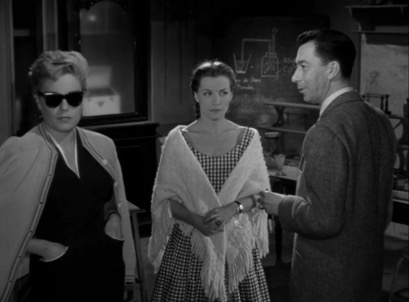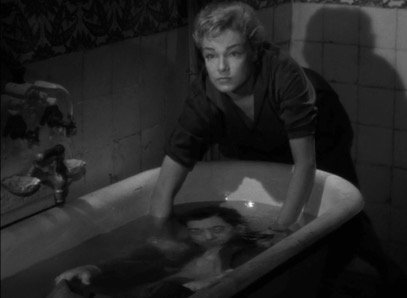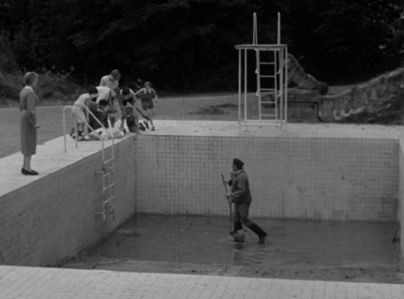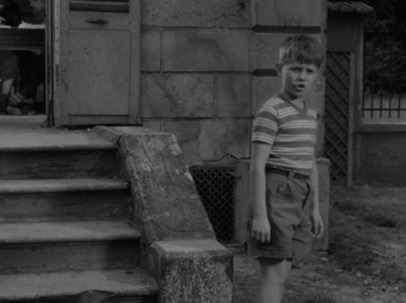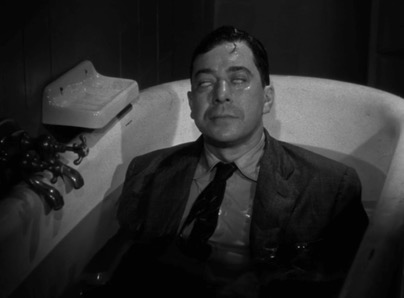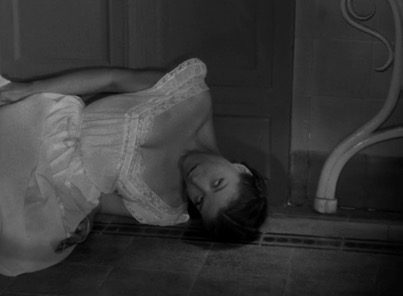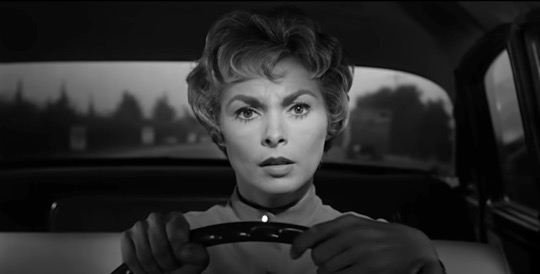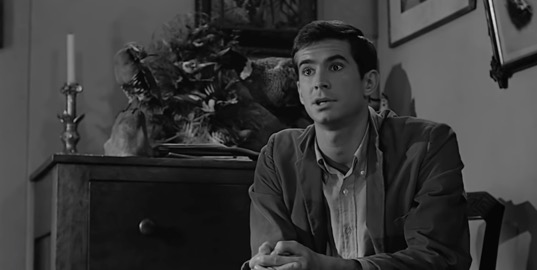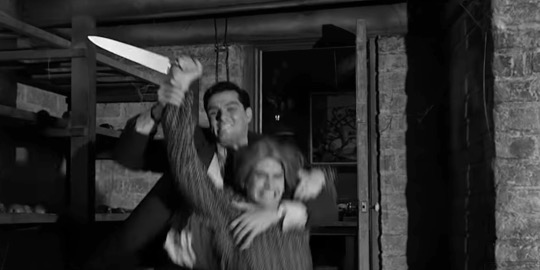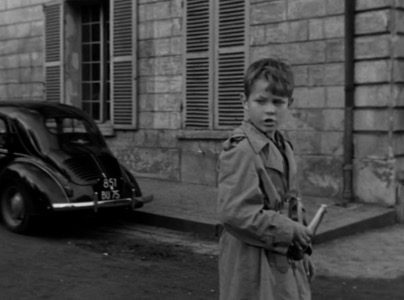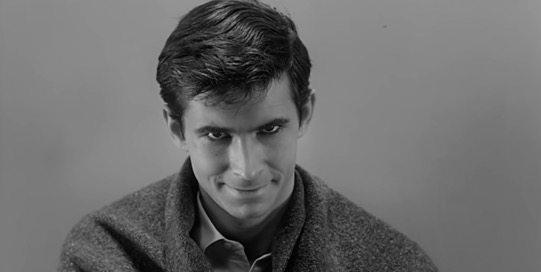(This article contains spoilers for Psycho and Les Diaboliques. And The Sixth Sense.)
This past year marks both the 60-year anniversary of Psycho and the 65-year anniversary of Les Diaboliques. Psycho, directed by Alfred Hitchcock, has become one of the most famous movies of all time. Its brutal murder in a shower and its jolting all-strings score by Bernard Herrmann have acquired the status of memes. Even people who haven’t seen the movie have mimed stabbing movements while emitting staccato screeches to evoke the idea of a psychopath.
Les Diaboliques, made 5 years before Psycho by French director Henri-Georges Clouzot, isn’t as well-known these days, though we might not have Psycho without it. In the early 1950s, Hitchcock was desperate for the rights to the novel on which Diaboliques was based, but Clouzot ultimately won. People have speculated that Psycho was Hitchcock’s attempt to outdo Clouzot. There are certainly parallels within the movies: both are set in creepy collective living spaces (a boarding school, a motel), both depict grisly murders in bathtubs, and both end with a mind-blowing plot twist that pulls the rug out from under us. It’s this last part I want to focus on.
At the time of their release, both movies worked hard to protect their twists. After announcing “The End,” Diaboliques sent viewers out into the world with a disclaimer:
The final disclaimer:
Don’t be DIABOLICAL!
Don’t destroy the interest your friends might take in this film.
Don’t tell them what you’ve seen.
Thank you on their behalf.
Five years later, movie theaters screening Psycho were instructed not to let anyone enter the movie late or leave in the middle, and in some (perhaps apocryphal) cases stationed ambulances outside to tend to viewers overwhelmed by the ending.
All this elaborate management of the audience’s experience seems to confirm the widespread assumption that plot twists are just one-shot disposable tricks. So then why do Diaboliques and Psycho still hold up more than half a century later? Why do they continue to astonish first-time viewers and delight returning fans? Whether you’ve watched one or both or neither of these movies, I want to persuade you that they’re both absolutely worth watching (again) now. Why? Because Diaboliques and Psycho both achieve something very rare: a perfect plot twist but an unspoilable movie.
A plot twist is a machine for sudden dizzying reinterpretation. Bruce Willis is really a ghost! With a lurch we realise that we knew so much less than we thought, but can now look back and see a string of clues hiding in plain sight. The metaphor of having the rug pulled out from under us captures the sense that what we thought was firm ground was in fact a ruse to wrong-foot us. A good plot twist blows our mind by playing on what we know, and what we only think we know. In this way, it transforms an audience’s ignorance and misunderstanding—hardly promising material—into a source of delight.
Diaboliques and Psycho‘s plot twists do this, but they also do more: they consistently invite us to feel an intense (but misplaced) knowingness. By knowingness I mean the way having knowledge makes us feel. Knowledge can make us feel smug and self-satisfied or serenely superior, or it can fill us with anxious dread or agonising anticipation. These movies let us in on massive secrets (murder! crime!) early on, so that we feel like insiders and watch scenes where other characters fail to uncover those secrets. But we fail to realise, until it’s too late, that the movie is keeping other, bigger secrets from us.
* * *
Diaboliques begins with a bad man flaunting what should be secrets. Michel (a slimy Paul Meurisse) is the bullying headmaster of a boarding school near Paris. He’s openly having an affair with Nicole (Simone Signoret looking like a proto-Hitchockian icy blonde), one of the schoolteachers, making no attempt to hide this from his wife Christina (played wide-eyed and shawl-clutchingly by Vera Clouzot, the director’s wife), also a teacher at the school. Even worse, Michel is physically violent and psychologically abusive towards both women. He gives Nicole a black eye and torments the fragile Christina, who suffers from a heart condition, making her eat rotten fish in front of the entire school. Michel’s abuses are publicly known, while the women must keep up appearances.
We experience events from Christina’s perspective, and once she and Nicole are alone together we discover they’re better at keeping secrets. Nicole proposes a secret plot to Christina that will end Michel’s abuses permanently: murder! The women lure Michel to an apartment in Nicole’s small home town, where he hits Christina and then angrily begins drinking the whiskey which the women have knowingly spiked with a sleeping tincture. Before long, Nicole is filling the bathtub with water and holding Michel’s drugged body under the water with remarkable sangfroid while the more sensitive Christina looks away in horror.
The next day they drive the waterlogged body back to the school, and at night roll Michel’s body, now with eyes grotesquely glazed, into the school’s swimming pool. Eventually the body will float to the surface, and it will seem like Michel drowned accidentally in the school’s pool while the women were hundreds of miles away.
But the body doesn’t resurface. The pupils and other school teachers begin to speculate about Michel’s absence, while we share the women’s dark knowledge of what really happened. Nicole fake-accidentally drops a set of keys into the pool, and when the janitor drains the pool Christina looks in and faints in horror—not at the sight of a decaying corpse but because the body isn’t there! Like Christina, our knowingness is first shaken and then shockingly undercut. The vanished body suggests there are further secrets of which the women were unaware. (In contrast to Christina and first-time viewers, returning viewers might be starting to full smugly knowing here.) Nonetheless, we’re still aware that we know more than the school pupils and teachers: we know why Christina has fainted, we’re in on her and Nicole’s secret at least.
Then, strange occurrences begin to pile up. The suit Michel was wearing that fateful night is delivered to the school by a local dry cleaner. A school photograph is taken and seems to have captured Michel’s face in the gloom of a window. A young schoolboy smashes a windowpane with his catapult, and obstinately insists Michel returned to punish him. Is Michel acting from beyond the grave? Did someone take the body in order to blackmail the women? Are their minds playing tricks on them?
“I saw him, I did, I know I saw him”
Still, for all these mysterious new questions, we’re still in on the secret of the women’s murder plot. Privately, though, they begin to unravel. Christina in particular seems to be crumbling under the guilt and anxiety, which in turns makes Nicole increasingly irritable. We share the women’s grim irony as they have to listen to patronizing mansplaining that isn’t even aware of how much it misses. A detective appears on the scene, and the discrepancies in knowledge start generating not only irony but tension: we watch anxiously along with Christina and Nicole as the detective paces around the school, asking questions and noting details that might reveal the women’s murderous plot.
Christina becomes increasingly unwell, and a doctor orders her to stay in bed due to her heart condition. That night, at the movie’s climax, Christina is drawn from her bed by strange noises and shadows. Lured into the bathroom, she turns to see Michel’s body once again submerged in a bathtub.
Christina falls to the ground gasping. As if in a nightmare, the body begins to move. It rises uncannily, dripping bathwater. The hideously glazed eyes of the drowned man turn towards Christina. She looks back with horror, emits a few groans, and then slumps down dead.
So Michel was seeking his revenge from beyond the grave!
But no—almost immediately the energy in the room changes. Michel pops out a set of white contact lenses, revealing his normal eyes underneath. Nicole enters, they check Christina is really dead—yes, the nightmarish spectacle has given her a long-threatened heart attack. Michel and Nicole embrace and rejoice at the small fortune they’ll inherit now Christina has died of natural causes. All along, we thought Christina and Nicole were in cahoots, when in fact Nicole and Michel were the real allies.
Looking back, we realize that because we saw the murder from Christina’s perspective we never actually saw the entire drowning—while Christina was looking away there was plenty of time for Nicole to let Michel come up for air. Our feeling of being insiders on the women’s secret plot kept us from considering that Nicole might have secrets of her own. If we’d given it any thought, we’d have assumed that the diaboliques—the devilish ones—were Christina and Nicole. Now we discover that the real devils are Nicole and Michel.
So here we have our big reveal—the secret that I’ve been trying to avoid spoiling until now. But the movie isn’t done with its twists yet. When I recently rewatched this movie, knowing this twist, I was disconcerted to find this wasn’t the movie’s last surprise. I rewatched it feeling pretty smug, and then discovered that even my knowledge as a returning viewer was misleading me.
The wicked couple gloat, and we’re briefly realigned with their sense of their own superior knowledge compared to Christina, before that too is undercut. The detective enters and arrests the couple. We feared he would discover the women’s murder plot. Instead he discovered the plot beneath the plot. The architects of the movie’s central plot twist now also experience one themselves.
In this series of dizzying reversals, the movie keeps provoking our knowingness only to undermine it. While the big reveal of any plot twist throws us from the illusion of knowledge into an intense ignorance that leads to a new, superior knowledge, the last few minutes of Diaboliques pitch us back and forth between feelings of ignorance and knowingness so that we’re left exhilarated but unsure what solid ground is even left.
* * *
While Diaboliques ends with twists upon twists, Psycho is a rare example of a story that contains two totally distinct plot twists, one near the start, one at the end, and it uses the knowingness generated by the first twist to set viewers up for the second.
In the first 25 minutes of the movie, we follow Marion Crane (Janet Leigh, seductive with a hint of sadness) as she lounges in bed with her married boyfriend, deals with a sexist boss at the bank where she works, impulsively steals $40,000 cash (around $350,000 in today’s money) and goes on the run. She’s in every scene, her goals propel the action. As she drives through the night to reunite with her boyfriend, she stops to sleep at the Bates Motel.
While checking in, she makes polite small talk with the manager Norman (Anthony Perkins, sweet and over-sincere), who overshares about being trapped at the motel with his mother. We share Marion’s condescension towards this sweet but feeble young man, henpecked by his disturbed mother but too attached to ever leave. And we feel superior because we know about Marion’s secret crime that the wide-eyed Norman couldn’t dream of.
“We’re all in our private traps”
In her room, Marion undresses to take a shower. Norman spies on her through a peephole. Shortly thereafter, the shadowy figure of Mrs Bates enters the bathroom to brutally put an end to a seduction Marion wasn’t even aware of inciting. The now infamous shower scene has begun.
The first twist: Marion isn’t the main character, she’s the story’s first victim.
The shower scene is so infamous that it’s hard for viewers today to experience the initial shock of this twist. But the movie in fact did a lot to set early audiences up for surprise. Like Diaboliques, Psycho invites audiences to misattribute the title to the wrong character. Marion acts recklessly, is visibly rattled and even hears voices as she drives, making her initially the movie’s obvious candidate for psycho status. Add to that the fact that Janet Leigh was the movie’s big star and featured front and center on the poster, and you’d expect to be with Marion for the long run.
(While Psycho‘s first twist may no longer surprise, this type of twist does seem to work afresh for every generation: for some it was Drew Barrymore getting bumped off 10 minutes into Scream, for others it was Sean Bean, the biggest name in Game of Thrones, losing his head before the end of the first season. The site TV Tropes even has a name for this: Dead Star Walking.)
Like Christina in Diaboliques, a character whose perspective we’ve shared is killed by something she never saw coming. Her secret turns out not to be the story’s most important secret. Marion’s secret turns out to be irrelevant, and so audiences being in on her secret is irrelevant too.
But we do have a new secret that drives the plot forward: we’ve seen Norman discovering Mother’s murder and covering it up. For most of the rest of the movie, we align with Norman’s knowledge, even though we don’t root for him: when Marion’s boyfriend and sister come investigating we know where they should be looking for clues, what questions they should be asking. When the local sheriff reveals that Mrs Bates is dead and buried, we know that there’s been some trickery as she’s alive and kicking (and stabbing) at the motel. Our knowingness kicks in once again, but this knowingness isn’t tinged with smugness so much as with frustrated impatience—no, don’t go in there! figure it out already! (And if you know what revelations are ahead, this investigation phase feels doubly frustrating.) Scene after scene, the knowledge we share with Norman feels agonizing.
Which brings us to…
The second twist: Mrs Bates really is dead, but the murderous Mother is a split personality in Norman’s mind.
There’s a deeper secret behind the secret we thought we knew, and that the characters needed to uncover. The real psycho is the sweet young man nobody would ever suspect (though he did have that weird interest in taxidermy…).
As with Diaboliques, we thought we were in on the secret of a murder and coverup, and were waiting to see if others would discover it. In fact the knowledge we shared with one of the characters bamboozled us, as it did them. In Diaboliques, Christina was the victim of a plot within a plot, her partner in crime secretly scheming against her. In Psycho the added complication is that Norman is keeping a secret from himself, one part of his mind is plotting against another. We thought knowing what he knew put us in a position of superior knowledge, when in fact it led us to misunderstand the situation as tragically as he did.
* * *
Both Psycho and Diaboliques manipulate feelings of knowingness throughout, culminating in the intense revelation of a whole series of misunderstandings at their denouements. Despite suddenly revealing audiences’ misunderstanding, plot twists usually leave us with a firm sense of certainty at the end. They eventually reveal all the truth, and give us a powerful new interpretive framework that perfectly makes sense of what came before. But that’s not quite how it works in these two movies. After the big reveal of the plot twist, both movies end with a brief flourish that isn’t a full-blown twist but does unsettle our knowingness one last time.
After the double reveal at the end of Diaboliques of Michel and Nicole terrorizing Christina to death, and the detective catching them in the act, we cut to the next morning. The young schoolboy with the catapult smashes another windowpane, and when a teacher asks how he got the catapult back the boy says Christina gave it back to him. The teacher admonishes him that Christina has died, to which the boy simply replies “she isn’t dead, because she came back”. The boy is sent to stand in the corner, as he obstinately repeats “I saw her, I did, I know I saw her”. Fade to black, “The End.”
“I saw her, I did, I know I saw her”
In the moment, it’s hard to know what to make of this final scene, because its significance depends on how we understood earlier scenes that have, just in the last few minutes, been cast in a totally new light. When the boy claimed earlier to have seen Michel, we (thought we) knew Michel was dead and so assumed the boy must either have been tricked or actually seen a ghost. Now we know that he really did see Michel alive. So does that mean he has really seen Christina too? Is she alive, despite what the teacher says? Is this yet another ruse? Is she the movie’s first and only real ghost? The movie doesn’t give us enough evidence—or time—to come to any conclusions.
And even that isn’t quite the end of Diaboliques. Remember that final disclaimer? “Don’t tell them what you’ve seen.” It might seem like a simple instruction, but placed alongside “I saw her, I know I saw her”, the movie reminds us one last time of what it’s repeatedly demonstrated: that seeing may be believing, but it’s not necessarily knowing.
Psycho too, after the big reveal, ends on a note of uncertainty. First a psychiatrist confidently explains Norman/Mother’s psychology in terms of repression and guilt, before we move into the jail cell and hear Norman/Mother’s crowing at having misled the psychiatrist. Each claims to know more than the other, and we have no way of knowing who’s right.
“Why, she wouldn’t even harm a fly…”
So yes, while it’s a spoiler to tell your friends that Nicole is secretly in cahoots with Michel against Christina or that Norman and Mother are the same person, in their final moments these movies raise new doubts about the solid ground we finally felt we’d reached.
I’m reminded of a moment from Friends in which dopey Joey is told not to reveal anything about a pileup of secrets, bluffs and double bluffs, and he responds “couldn’t if I wanted to”. The dizzying twists of Diaboliques and Psycho resolve into new mysteries that—even if we wanted to—we couldn’t spoil
Whereas most plot twists create a vast difference between the first and subsequent experiences, these two movies make viewers’ knowingness (generating it, undermining it) an integral part of every viewing experience. And whereas most plot twists leave us with the pleasing satisfaction of now, finally, perfectly knowing what’s what, these two deliver that deep satisfaction in their big reveals, and then gently tweak the rug one final time, just to remind us not to feel too knowing just yet.



